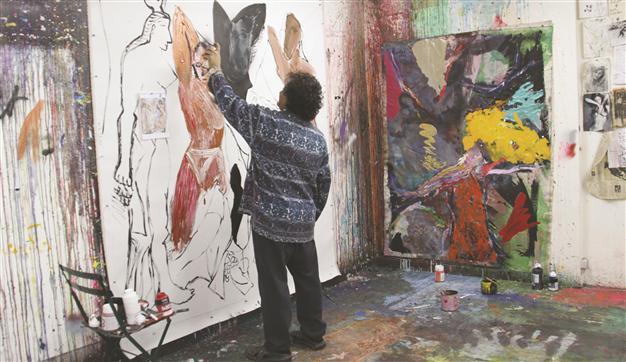Turkish artist Bedri Baykam eyes politics via his art
ISTANBUL - Hürriyet Daily News

‘Women, art history and materiality of paint, landscapes and beauty: All these things feed me and politics with its major historical personalities is a big source for me,’ says Bedri Baykam.
Bedri Baykam is an artist who reflects art history and his own past in his paintings. “Voyeur of History,” his current exhibition at Piramid Sanat, is the result of his paintings from the last two years. The collection is also set to be shown in Paris. The paintings were done over the last two years but also witness 53 years of Baykam’s relationship with art.The paintings, according to Baykam, summarize and make a synthesis of all his art. “The first impression you get from looking at them is [that they resemble] my Neo-Expressionist works, which I did in the ‘80s, but with a second approach, when you look at them more closely you get to see that they are very different in the way they are painted and conceived,” he said.
Although they remind the viewer of the works done by artist in the early days of Neo-Expressionism at the start of the ‘80s, these works are much more a synthesis of the artist’s different periods, such as “The Transparent Layers’ (1998-99), “The Real-Fakes” (1987-1992), “The Harem Intrigues” (2000-2002) and “Lolitarte” (2006).
His new paintings took much longer to complete, he said. “In the ‘80s, when I was young, a painting like this took five to seven hours, sometimes those take five months, sometimes five weeks, but they mature very slowly, every layer made with technical details. The materials are found very slowly.”
In the past if someone had told Baykam that he would be very patient in painting, he would never have believed it. However, now he is patient and spends more time on his works. The exhibition includes many details of his own history, and the title of the exhibition indicates his relationship with history and with his own history.
 Baykam likes to vary the materials, details and even the brushes he uses in his paintings, so repetition is not in his vocabulary. “I am not an artist who always uses textiles in his art, or uses photography collages, or always uses graffiti, broken mirrors or politics.”
Baykam likes to vary the materials, details and even the brushes he uses in his paintings, so repetition is not in his vocabulary. “I am not an artist who always uses textiles in his art, or uses photography collages, or always uses graffiti, broken mirrors or politics.”At the bottom of it, when it all comes together, it all signifies one thing: Baykam’s artistic style is free.
Baykam uses abstraction and any kind of material he wants. For him art is infinite and limitless. “That’s why I can create 4-D paintings or collages.”
Art should be a challenge and involve risk-taking, according to Baykam. “I am not a conceptual artist only, or a happening artist only or a canvas artist only. What I am is not limited on the canvas and canvases also cannot limit me.” Baykam does not need to identify his art as his technique and style vary. He does not need to identify the canvases with words because he has said everything he does is an answer to passé dichotomies.
Not only politics; but there are many things feeding Baykam’s art. “Women, art history and materiality of paint, landscapes and beauty: All these things feed me and politics with its major historical personalities is a big source for me,” he said.
“I entered politics as a baby, because I was born to a very political family. My father was one of the youngest right hands of President İsmet İnönü, and as he was the president of the CHP [Republican People’s Party], my father was the first young activist student and then young parliamentary deputy [to do so]. My father worked very closely with İnönü.”
Baykam’s father has served a very important role for him and his becoming who he is in politics today. “Thanks to my father I have understood the ideology of Kemalism, and this ideology is a global; it is beyond nations,” he said.
Politics are also reflected in Baykam’s art. One of his paintings depicts the oil wars between the Middle East and Western countries. A baby is on one side of the canvas and on the other side there is an angel of death and bombs are falling. “Unfortunately people are not taking any lessons from wars and their badness,” he added.
All these factors make the paintings by Baykam timeless pieces, and his current exhibition will be traveling to Paris’ Galeri Lavignes-Bastille Feb. 26 to March 23.
















